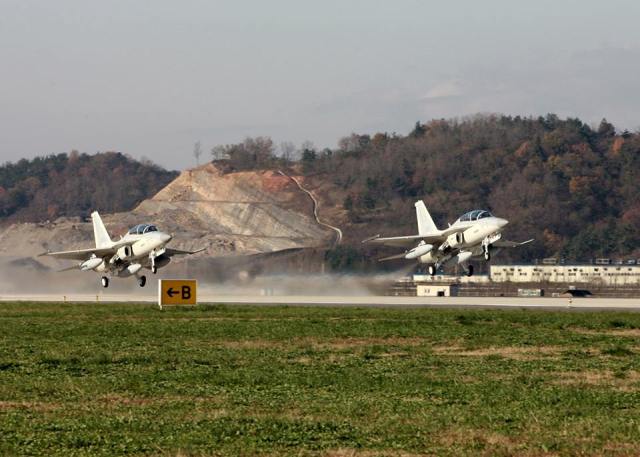
Critical of the procurement of the supersonic FA50 fighter jets, president-elect Rodrigo Duterte said that the jets are no match to China’s aircraft and the government had just wasted money in acquiring the aircraft. KAI/Released
Incoming Armed Forces of the Philippines (AFP) chief Lt. Gen. Ricardo Visaya defended yesterday president-elect Rodrigo Duterte’s stand on prioritizing acquisition of modern helicopters instead of fighter jets to address the country’s internal security problems.
Visaya said Duterte wanted to first bolster the military’s internal defense capabilities before gradually shifting to external defense.
“The president-elect only wanted the military to have modern helicopters with night-flying capability as well as naval fast craft for internal security operations,” Visaya said.
He added that the AFP modernization program will still push through, but the priority would be internal security operations first.
Critical of the procurement of the supersonic FA50 fighter jets, Duterte said that the jets are no match to China’s aircraft and the government had just wasted money in acquiring the aircraft.
The Aquino administration has invested billions of pesos in the AFP modernization program in light of the current security situation in the region spawned by China’s bullying and aggressive occupation of the country’s maritime domain in the West Philippine Sea.
Duterte has declared that he will not go to war with China on maritime issues, saying he will not risk the lives of Filipino soldiers in pushing the country’s claim over Panatag (Scarborough) Shoal.
Visaya said the AFP needs more helicopters that could fly at night and could be used against lawless elements.
“We don’t have enough helicopters with night-flying capabilities. The president-elect noticed that during the Samal abduction, the AFP lacked the needed equipment,” Visaya said.
Abu Sayyaf bandits kidnapped three foreigners and a Filipina in a resort in Samal Island in Davao last year and the bandits brought the hostages to Sulu.
Currently, the Air Force has 50 operational helicopters but only a few have night-flying capability, while the Navy has 60 fast-attack craft, including patrol gunboats.
“The president-elect might just be misinformed or ill-advised as to the objective why we have procured these aircraft,” an Air Force official, who asked not be named, said.
The official stressed that these FA50s are a vital component of the Air Force capability upgrade and modernization program that is aimed at rebuilding the country’s air power that is now lagging behind other countries in the region.
He said that the two delivered jets are trainer aircraft to prepare Filipino fighter pilots in handling supersonic fighter jets.
“If we want other countries to respect us, we should be also carrying a big stick and we are already heading towards that objective,” he said.
However, he said that if the modernization program is shelved, the AFP as a professional organization would have no other choice but to follow the wisdom of the country’s political leadership.
Under the modernization program of the Aquino administration geared towards territorial and external defense, the AFP is also working out the acquisition of two brand-new frigates worth P18 billion, two long-range patrol aircraft worth P5.9 billion, two anti-submarine helicopters for P5.3 billion and surveillance radar worth P2.6 billion.
Incoming defense chief Delfin Lorenzana said that he believes that insurgency is not solely a military problem but that of the community as well, but he is leaving this to current commanders of the AFP to formulate the strategy regarding security concerns.
He belied reports that he is planning to replicate the anti-insurgency tactics that involved the community aspect that he employed while still an Army battalion commander in Davao.
Lorenzana, then commander of the 2nd Scout Ranger Battalion based in Davao in 1987, closely supported then Davao City mayor Duterte in clearing the city of insurgents and criminal syndicates.
“The insurgency situation in 1987 is very different from today. It could be a model (his own approach before) in a way that it involved the community in a very big way – meaning insurgency is not solely a military problem but a community’s. We can only succeed in fighting it if we are in it together – the people, local government, and the police,” Lorenzana said.
As this developed, Visaya ordered Bicol-based troops not to relax or lower their guard but to sustain their anti-insurgency operations.
http://www.philstar.com:8080/headlines/2016/06/24/1596154/next-afp-chief-defends-rodys-military-aircraft-priorities

No comments:
Post a Comment
Note: Only a member of this blog may post a comment.